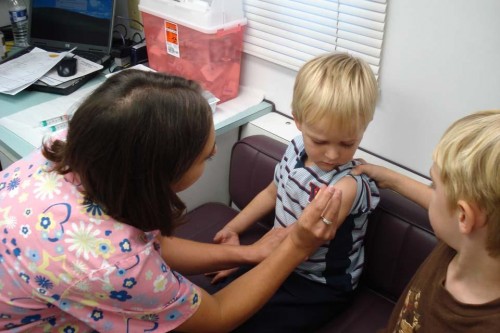‘Hoppy ANT-iversary’ Audubon Insectarium
June 9, 2009
Stephen "Joe" Andras
June 11, 2009The Greater New Orleans Immunization Network mobile unit is coming to the Houma-Thibodaux area to offer immunizations to anyone younger than 18 years old.
Locals can have their children immunized in time for school by attending the area’s free clinics. Thibodaux’s clinic is set for June 23 at Rouses Market, 204 N. Canal Blvd. from 2 to 6 p.m.
For those who can’t make it to the Thibodaux clinic, Houma has a clinic set for July 21 at the Home Depot on Martin Luther King Boulevard from 2 to 6 p.m.
Parents must register their children during those times to have them immunized.
The Greater New Orleans Immunization Network started its immunization campaign for children in the metropolitan New Orleans in April 1998.
Christian Health Ministries partnered with several area hospitals to focus on increasing the immunization rates for children by age 2.
“Our job is to raise parental awareness of the importance of timely infant immunizations by establishing a systematic method to locate and immunize children and by providing convenient access to immunization services,” said program head Charmaine Allesandro.
Combining the elements of an immunization registry and a mobile immunization unit, GNOIN set out to protect Louisiana’s youth from vaccine-preventable diseases.
“Coverage rates are easily calculated to establish and monitor the immunization rates of children,” Allesandro said. “As families move in and out of public and private health care systems, registries serve as a powerful tool to ensure that children receive timely and proper immunizations.”
Children are enrolled in the program’s network registry at all 10 of the network hospitals and on the mobile immunization unit.
“Health care providers are key to the success of any immunization effort,” Allesandro said. “With the active participation of private physicians, nurses and other health care providers, we can positively impact the health of children in our community.”
The Greater New Orleans Immunization Network will be administering vaccines for the following diseases:
• Diphtheria, a throat infection that makes it very hard to swallow and breath;
• Haemophilus Influenza Type B that causes joint, eye, ear and lung infections, and meningitis, which may lead to brain damage or death;
• Hepatitis B, a liver infection that can lead to liver damage, liver cancer and, in some cases, death;
• Hepatitis A, a liver disease that causes flu-like symptoms, jaundice and severe diarrhea;
• Human Papillomavirus, the most common sexually transmitted virus in the United States. HPV can cause cervical cancer in women;
• Flu, a contagious respiratory illness caused by influenza viruses. It can cause mild to severe illness, and at times can lead to death;
• Measles, which causes a high fever, rash, sore eyes and cold-like symptoms. It can lead to hearing loss, breathing problems, pneumonia, brain damage and death;
• Meningitis, a serious infection in which fluid surrounds the brain and spinal cord. One out of every 10 people who get this disease will die from it;
• Mumps, which causes headache, fever and painful swelling of the cheeks and jaw. In some cases, it can lead to hearing loss, swelling of the brain and spinal cord, and brain damage.
• Pertussis (whooping cough), long spells of coughing that makes it hard for a child to eat, drink and breathe. It can lead to pneumonia, seizures and death;
• Pneumococcus, one of the leading causes of serious illness among young children worldwide. It is the most frequent cause of meningitis, blood infections, pneumonia, sinusitis and ear infections;
• Polio, which causes lifelong paralysis and deformity;
• Rotavirus, a virus that causes severe diarrhea often accompanied by vomiting and fever. It occurs mostly in babies and young children;
• Rubella (German measles), which causes fever and a rash on the face and neck. A pregnant woman who gets rubella can lose her baby, or have a baby with severe birth defects. It is highly contagious;
• Tetanus (lockjaw), which causes severe muscle spasms, breathing and heart problems, and may lead to death;
• Varicella (chicken pox), a highly contagious disease that causes fever, tiredness, and weakness, followed by an itchy, blister-like rash.
Most recently, the state of Louisiana is also requiring all children 11 years old or older to have a meningitis vaccination before starting school this year.
Meningococcal meningitis is a potentially deadly infectious disease caused by bacteria. Although it can affect anyone, it is a leading cause of meningitis in children 2- to 18 years old.
The meningococcal conjugate vaccine (MCV4) was approved and licensed in 2005 and is the preferred vaccine for people 11 to 55 years old.
“It cannot prevent all types of the disease, but does protect many people who might have become sick if they had not received the vaccine,” Allesandro said.
The Greater New Orleans Immunization Network is also offering the Gardasil vaccination that protects against human papillomavirus (HPV) for females ages 11 to 26.
Health care officials say it is one of two vaccines (Cervarix is under development) that has made the most significant strides in the prevention of cervical cancer. It is given in a three-dose series.
GNOIN will give vaccinations to females through the age of 18, Allesandro said.
“It is important that girls receive the vaccine at this young age before their first sexual contact because they have not been exposed to HPV,” she said. “Giving the vaccine to young girls can prevent most cases of cervical cancer. The HPV vaccine may be given at the same time as other vaccines.”
During the cold and flu season, it’s important for parents to be aware of another serious illness that could affect their teenagers called pertussis, commonly known as whooping cough.
Pertussis is a highly contagious bacterial infection of the respiratory system that causes spasms of severe coughing and often masquerades much like a cold or the flu. Statistics show that 39 percent of all the pertussis cases in 2003 affected children between the ages 10 and 19 years old.
Allesandro said children receive their last pertussis vaccine at 4 to 6 years old. She said few parents realize that the protection from this immunization wears off after 5 to 10 years.
Two adolescent vaccines for pertussis are now available.
On the immunization day, parents should bring with them their child’s immunization record. After immunization, the child may feel some discomfort.
Ask a health provider for advice on using a non-aspirin pain reliever to ease any pain the child might have. A cool wet cloth can also reduce redness, soreness or swelling where the shot was given.
At-home parents should mark their calendar for the child’s next appointment and review the vaccine information statements for possible reactions over the next few days. If a small rash appears or the child contracts a fever, call your doctor or seek medical attention.
The GNOIN is able to immunize thousands of children with the support of Ronald McDonald House Charities of Greater New Orleans, which donated to the group its second mobile immunization unit.
Also lending a hand are Baptist Community Ministries, a private grant-making foundation committed to a healthier Greater New Orleans area; Christian Health Ministries Foundation, who serves as a financial storehouse of community support, and New Orleans area hospitals.
For information, visit the GNOIN Web site www.GNO-shots4kids.com.
The Greater New Orleans Immunization Network mobile immunization unit is coming to the Houma-Thibodaux area to offer free immunizations to youth 18 years and younger. The clinics will be in Thibodaux on June 23 at Rouses Market, 204 N. Canal Blvd. from 2 to 6 p.m.; and Houma on July 21 at the Home Depot on Martin Luther King Boulevard from 2 to 6 p.m.













